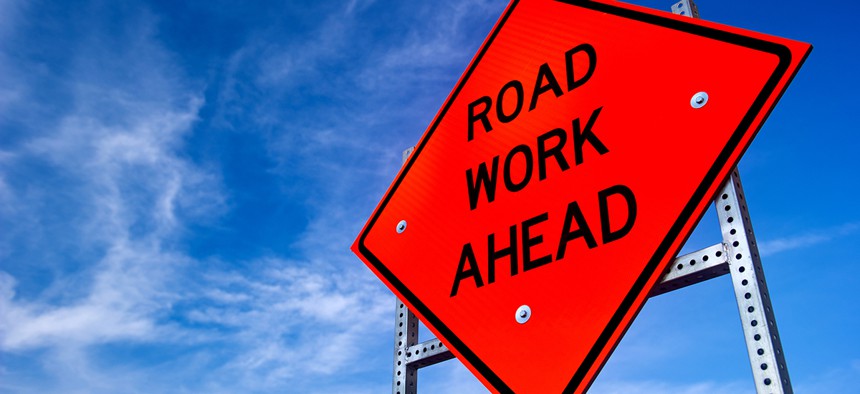
infinity21/Shutterstock.com
Congress Can't Solve the Infrastructure Crisis
No one can agree on how to pay for the Highway Trust Fund for the remainder of the year, let alone for the years ahead.
Congress does many things poorly, but there are few issues it has handled worse in recent years than providing funds for transportation and infrastructure. That’s not a point you’re likely to hear either Democrats or Republicans contest.
On Tuesday, the House passed a two-month extension of the Highway Trust Fund, which is set to expire at the end of the month. The stopgap measure would prevent a damaging shutdown of infrastructure projects across the country, but as lawmakers spent an hour debating the bill, all they could talk about was failure. Despite bipartisan agreement that the nation needs a long-term program to repair and replace its aging roads, rails, and bridges, Congress has been plugging the trust fund like a driver who refills his gas tank one gallon at a time.
“We have known for months that this day was coming, and we have made no progress,” lamented Representative Jerrold Nadler, a New York Democrat. Minnesota’s Rick Nolan called the situation “a national embarrassment,” while a third Democrat, Lois Frankel of Florida, said the 60-day patch was the equivalent of slapping silly putty on a cracked bridge. Republicans, whose districts contain just as many creaky overpasses and congested highways, complained about the extension in only slightly less dire terms. Senator James Inhofe, the Oklahoma Republican famous for his denials of climate change, told the Huffington Post that his own party was to blame for the absence of a long-term solution and said a “true conservative” would support federal spending for roads and bridges.
The deadly crash of an Amtrak train last week outside Philadelphia cast an even brighter spotlight on the nation’s infrastructure woes. While the cause is still under investigation, Amtrak has pushed for more funding for years. The passenger railroad says it needs as much as $20 billion to dig new tunnels under the Hudson River and upgrade its rail lines. Just a day after the crash, House Republicans, who have been critical of the money-losing railroad’s management, voted to cut Amtrak’s budget by $260 million—a move that drew howls of protest from Democrats.
Both parties want to pass a plan to provide funding for surface transportation projects for up to six years, but they are stuck—and have been for a long time—on how to pay for it. The federal gas tax finances the Highway Trust Fund and hasn’t gone up in more than 20 years, but Republicans and many Democrats refuse to raise it, even as many red states have recently done so on their own to fund their transportation needs.
The most popular alternative at the moment is to use revenue generated by taxing repatriated earnings that U.S. companies now keep overseas. But there is disagreement over the details of that proposal, and Republicans believe it would only work if included in a broader tax-reform plan—an even heavier political lift. In fact, the reason Congress is reauthorizing the Highway Trust Fund for just two months is because lawmakers couldn’t agree on how to fund it for the remainder of the year, let alone for the rest of the decade. It has enough money to last through July, and Republicans are reluctant to simply transfer more money from the Treasury’s general fund, as they have done in the past. As a result, Congress probably will have to pass yet another extension this summer, which would be the third in the last year. A highway bill lasting for more than two years hasn’t passed on Capitol Hill in a decade.
The stopgap funding is bad, advocates say, because the biggest infrastructure projects can takes years of planning, and states won’t start them without knowing how much money they’ll get from the federal government. Industry officials estimate that $2 billion in projects have already been pulled back so far this year because of the inaction in Washington. “There is a real effect if we don’t do something,” said Brian Pallasch, managing director of government relations at the American Society of Civil Engineers, which gave the U.S. infrastructure system a D+ in its most recent quadrennial report card.
The Obama administration has proposed a six-year, $478 billion plan called the Grow America Act that would pay for infrastructure by imposing a 14 percent tax on foreign earnings being held overseas by U.S. companies. Republicans would also use repatriation as a revenue source, but their proposals have called for a far lower rate, and there is broader skepticism of whether the idea would really generate enough money. “It does not provide us that long-term, sustainable source of revenue,” Pallasch said. “It really is a one-time shot in the arm.”
Over the last several months, a few Republicans have stepped forward to endorse an increase in the gas tax, including Inhofe and Representative Jim Renacci of Ohio. Yet the party leadership has ruled it out as an option. Outside groups are now hoping Congress will turn to a method of payment that, until recently, had gone out of style: deficit spending. Nick Yaksich, a vice president at the Association of Equipment Manufacturers, noted that Congress recently approved a major change in Medicare financing that was only partially offset by new revenue and entitlement changes, with the rest going on the national credit card. “Why can't there be a similar path forward on a six-year highway bill?” Yaksich asked. With deficit mania having died down, lawmakers may well come around to that idea—but probably not before punting a few more times first.
(Image via infinity21/Shutterstock.com)






